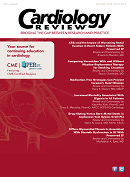Best Wishes for a Wonderful New Year!
This issue of Cardiology Review discusses many important articles and viewpoints that I am sure you will find quite useful.

Debabrata Mukherjee, MD, MS, FACC
Editor-in-Chief
I hope everyone had an enjoyable holiday season! I also want to wish everyone a wonderful New Year. With the holidays over, it is back to work for most of us, and this month’s Cardiology Review should help us in getting caught up with the latest news and advances in cardiology. This issue of Cardiology Review discusses many important articles and viewpoints that I am sure you will find quite useful.
Dr Glenn Levine delves into the efficacy of drug-eluting versus bare-metal stents in saphenous vein bypass graft percutaneous coronary intervention, and opines that the propensity of data favors the use of drug-eluting stents in patients undergoing saphenous vein bypass graft percu­taneous coronary intervention. He further states that additional data will likely be available at the end of 2016 when results of the VA Cooperative Study Drug-Eluting Stents vs Bare Metal Stents in Saphenous Vein graft Angioplasty (DIVA) study become available.
Drs Kazuhiko Kido and Tracy Macaulay discuss increased mortality associated with digoxin in atrial fibrillation patients, and state that it remains a matter of controversy whether use of digoxin should be stopped completely based only on study results from observational studies.
However, at the least, the use of digoxin should be strictly evaluated and its initiation selected with care in patients with atrial fibrillation. Until further evaluation, digoxin should be reserved for patients who have symptomatic hypotension and/ or heart failure with reduced ejection fraction, when other rate-control agents cannot be safely initiated.
Dr Harry Davis examines the benefit of a combined healthy diet and lifestyle on the incidence of myocardial infarction. He reflects that there is growing evidence that supports the reduction of morbidity and mortality through adoption of healthy dietary and lifestyle patterns. He suggests that physicians must pursue the development of patient behavior that increases the likelihood that patients will make healthier choices. However, this may well be an enormous challenge, and he paraphrases an old saying from many centuries ago: “The gate is narrow and the road is hard that leads to life, and there are few who find it.”
Dr Jimena Blandon reviews the role of angiotensin receptor blockers in heart failure patients with preserved ejection fraction and worsening renal function. She opines that randomized con­trolled trials that assess the relationship between worsening renal function and hard cardiovascular events (death, hospitalizations, worsening heart failure) in patients with heart failure with preserved ejection fraction treated with renin-angiotensin inhibitors are much needed before it will be possible to conclude that such agents are not effective or are undesirable in treating this group of patients. Dr Mushabbar Syed reviews diffuse myocardial fibrosis and its association with diastolic dysfunction in heart failure with preserved ejection fraction, and emphasizes that abnormal passive ventricular stiffness is likely the major contributor to diastolic dysfunction from diffuse myocardial fibrosis.
Dr Saurav Chatterjee examines varenicline with and without nicotine replacement therapy for smoking cessation and concludes that while varenicline, in combination with nicotine replace­ment therapy, was more effective than varenicline alone at achieving tobacco abstinence at 12 weeks and at 6 months, additional studies are needed to assess the long-term efficacy and safety of the combination.
For our Diabetes section, Dr Aparna Bhagavat reviews short- and long-term effects of intensive diabetes and blood pressure control. She suggests that that there is a significant benefit in sustained and continued blood glucose and blood pressure control on microvascular and event rate and overall mortality among patients with diabetes.
Finally, the insightful compilation of top stories and meeting highlights from the American Heart Association by our excellent managing editor, Ms. Jackie Syrop, should keep you updated on the latest happenings in this field. She discusses several key items in the news, namely the Dual Antiplatelet Therapy Study; IMPROVE-IT, the Vytorin (Ezetimibe/Simvastatin) versus Simvas­tatin trial; the BASKET-PROVE II study comparing safety and efficacy of 3 new types of coronary stents; and the EVOLVE II clinical trial to assess the SYNERGY stent system for the treatment of atherosclerotic lesion(s).
I hope that you will find these commentaries to be valuable and enjoyable. I encourage you to share your insights, thoughts, and personal experiences on the topics touched upon in this issue. On a broader level, I would love to hear feedback on how we can make this journal even better. My goal continues to be to make you look forward to every issue of Cardiology Review.
Debabrata Mukherjee
Editor-in-Chief
